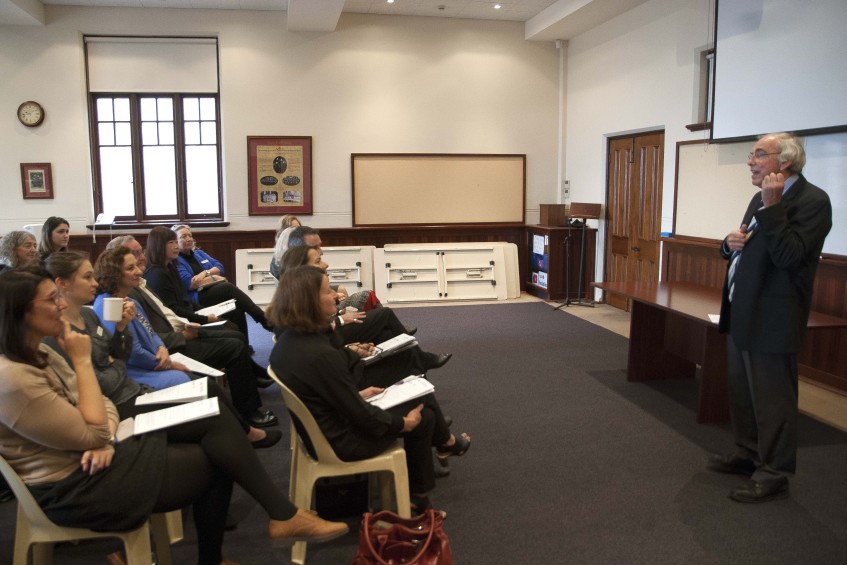Archdiocesan leaders urged to promote Gospel values in wake of Royal Commission

The Chair of the Truth, Justice and Healing Council (TJHC), Neville Owen, has warned leaders in the Archdiocese of Perth that they face an “uncomfortable time” ahead as the Royal Commission prepares its wrap-up hearing on the Catholic Church. Photo: Jamie O’Brien
By Rachel Curry
The Chair of the Truth, Justice and Healing Council (TJHC), Neville Owen, has warned leaders in the Archdiocese of Perth that they face an “uncomfortable time” ahead as the Royal Commission prepares its wrap-up hearing on the Catholic Church.
The TJHC is an 11-member council, which was set up in 2013 to co-ordinate the Catholic Church’s engagement with the Royal Commission into Institutional Responses to Child Sexual Abuse.
Mr Owen, along with the TJHC’s Chief Executive Officer, Francis Sullivan, addressed leaders from the Archdiocesan agencies on Thursday, 11 August at the Catholic Pastoral Centre in Highgate.
Mr Owen said the Royal Commission was preparing to hold a wrap-up hearing on the Catholic Church in February 2017, which would look into the reasons why child sexual abuse occurred within the Church’s institutions and why the response was so poor.
The Commission will examine factors such as clericalism, the seal of the Confessional, the formation of candidates for the priesthood and religious life, mandatory celibacy and the Church’s handling of civil litigation, he added.
“There is no doubt that that’s going to be an uncomfortable time for those of us in the Catholic Church, particularly for our leaders, who have to give evidence,” he said.
“This debate goes well beyond Royal Commission itself. We need to do whatever we can, to position the Church leadership so that when the dust settles, sometime in 2018, the Church leadership can re-enter the debate and really start to put the position of a return to Gospel values, which is what we are all about.”
Mr Owen, who is a former Judge of the Supreme Court of Western Australia, said this challenge was not limited to the clergy, but was one for all Catholics.
“You, as the leaders of Church agencies, have got to take the opportunities that you get, to be leaders yourselves, within this great conglomerate, amorphous body,” he said.
“One of the things that I’ve heard a lot, and which worries me, is so many people and so many organisations within our Church say, ‘Well, it’s not my problem. This happened years ago and it’s not my problem.’ It is our problem.”
Mr Owen said the TJHC would take the opportunity during the wrap-up hearing to show that the Church today was very different to the Church of the 1980s and earlier.
He said he was confident Catholicism had a strong future in Australia, despite the difficult task ahead.
“All of this, I think, is probably going to sound like I’m a pessimist. Actually, I’m not; I’m an optimist,” he said.
“I have seen nothing that causes me to doubt my affiliation with or commitment to the Catholic Church. I think we will survive, but the question for the faithful is this, what form do we want out Church to take?”
Mr Sullivan followed on from Mr Owen by speaking about the possibility of a national redress scheme for victims of child sexual abuse, for which the Church has been a strong advocate.
He estimated the proposal had less than a 50 per cent chance of succeeding, but noted that this could change following the release of the Royal Commission’s final report at the end of 2017.
“At the moment the political will to get anything happening isn’t there,” he said.
Mr Sullivan also said the TJHC, in conjunction with the Australian Catholic Bishops Conference and Catholic Religious Australia, was designing a new independent body to uphold professional standards across all of the dioceses in Australia.
